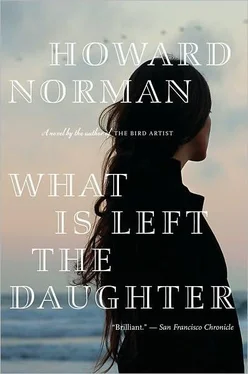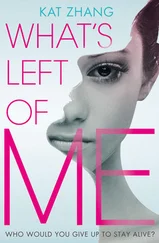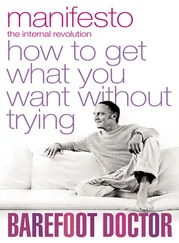"How do you mean 'nightmare'?"
"German U-boat sank the Caribou, and Constance might've been on it, on her way home from St. John's."
Parish stepped over to a dozen or so runners leaning against the wall, tapped one with his hammer and called out, "Take these with you." He went into his office. Before he shut the door behind him, I caught a glimpse of my uncle pounding his fist on the table. His face was contorted in a way that twisted up my own stomach. I loaded the runners into the back seat of my car, then drove straight to Middle Economy.
I carried the runners into the shed and went inside the house. As it happened, Tilda had also learned from Cornelia that Donald had gone to Truro, and what with his being absent like that, she took the opportunity to gather up a few personal items from her old room. I found her there paging through The Highland Book of Platitudes. When she looked over and saw me in her doorway, she said, "Randall's in bad shape, every breath painful, but he says he's going to build his record shop back up from scratch, and Hans and I said we'd help."
I didn't respond.
"What's the matter, Wyatt? Don't tell me nothing, because your face is all mayday! mayday!"
I sat on the bed next to her and took her hands in mine. "Tilda," I said, "one of the ferries Aunt Constance was taking. It's called the Caribou. "
"Jesus wept!" She pushed me away, stood and walked to the window and stared out. "Is it sunk for certain?"
"All I know is, I went to the blacksmith's shop to try and find Donald, and when I got there, Steven Parish said a radio bulletin had come in. And he said—"
Without turning from the window, Tilda said, "What? Steven Parish said what?"
"He said the Caribou was lost."
"But is it for certain Mother was on that particular run? Those ferries, every week or twice a week or whatnot, go Newfoundland-Nova Scotia and vice versa, correct? Plus, she said she was going to be a tourist along the way, remember? Gone a month like that. Ferry after ferry."
"I didn't know her exact schedule, Tilda. I only know Aunt Constance was ticketed twice on the Caribou. "
Tilda took five deep breaths, counting each one out loud. "Now, here's what I'm going to do," she said. "First off, I'm going to walk to the bakery. You won't drive me, because it's a good specific distance, to allow crying. Crying about what's not yet known for certain. Because, sad as any ferry sinking is, I realize my mother might not have been on that particular Caribou run, right? And as we speak, she may be fully alive, laughing and smiling at the christening — but I can't for the life of me remember the date of the christening. I know she was making a stop or two along the way. Or was that on the way back?"
"Today is October 14, is all I know," I said.
Tilda sat on her bed and immediately stood again. "Then once I get to the bakery, I'll go upstairs," she said. "Because Hans is organizing papers. Organizing papers toward his thesis in philology. We'll turn on the radio, and I'll say to my husband—"
She bit her lip and the rest of her thought never arrived, at least not out loud. Clutching The Highland Book of Platitudes to her chest, Tilda then hurried from the bedroom and the house, striking out for the road to the bakery.
For many of the next daylight hours, I slept the sleep of the dead on my aunt and uncle's bed. No dreams. After eating a dinner of leftover stew with bread and a glass of water, I heard my uncle's truck pull up. This was around seven P.M., already dark. He didn't come into the house, though. He went directly to the shed.
I left a floor lamp on in the living room, and the porch light, and drove to the bakery. I went right upstairs and knocked loudly, and Tilda let me in. Hans was sitting at their kitchen table, which was stacked with papers and books, some in German, some in English. Without a word, Hans went to the cupboard and brought out a quarter-full bottle of vodka, hesitated, then brought out a second bottle, that one new. He made room for the bottles on the table. Tilda set glasses down and Hans poured.
We raised our glasses, stymied for a moment as to what to offer as a toast. Tilda finally broke down and sobbed. Then she managed to say, "My mother didn't know how to swim. When I was a little girl, all those times she took me to the beach over at Parrsboro, and a few times to Advocate Harbor, where all the driftwood washes up. Muggiest summer day, she didn't so much as stick a toe in. Whereas me, I'd just fly into the water."
It seemed a stalwart obligation for Hans to try and distract Tilda away from thoughts of her mother, so he put Schubert's Impromptu in A-flat on their gramophone. I wondered, however, was it possible that Schubert's piano composition could incite Tilda to think all the more intensely about Constance? It had that effect on me. Because not a minute into it, I had the image of my aunt flailing in the ocean, not being able to reach a lifeboat. An image I might have got from one of those newspaper accounts on the shed wall.
"Where'd you get a gramophone?" I asked.
"Pawnshop," Tilda said. "The few phonograph records we've got here, Hans bought at a pawnshop, too. When we went to visit Randall."
I threw back my entire glass of vodka. It burned going down my throat, and I half choked out, "I admit I've never drunk this stuff before."
"Hans says to drink it cold as possible," Tilda said.
We sat in candlelight, drinking and listening. When Hans turned over the record, set the needle and sat down again, he said, "Wyatt, I understand what has happened."
"We don't know what's happened yet, Hans," I said.
"I think we do know, yes," he said. "I think a submarine from the country of my birth has killed my mother-in-law, Constance Bates-Hillyer."
"Constance might not have been on that particular run," I said.
Hans said, "Fine and admirable, Wyatt, to hope against hope. Yes, but I have studied the shipping news, as it's called. I went to the library and studied it in the newspaper. Also, I used Mrs. Tell's telephone. I paid her for five telephone calls to Halifax, to the ferry port. To the newspaper, Wyatt, I asked my questions. I've studied the ferry schedules, and I am deeply worried."
And that was pretty much all any of us said the remainder of the night. Sip by sip by sip we finished off both bottles of vodka as Hans played every one of the gramophone records they owned, twice over. We probably kept Cornelia awake, certainly troubled her sleep, but there was no knock on the door, no complaint. What's more, when it became light out, she slid a note under the door: I heard the news — may I have breakfast with you? Tilda, Hans and I were numb and exhausted from the vodka, our fear-of-the-worst. When would we know for certain?
Hans said, "I better wait awhile before I give Donald his gramophone records, don't you think?" He had only slightly slurred his words.
"Hans, I married a student in philology," Tilda said. "I did not marry a member of the crew from whichever U-boat sank the Caribou. I'll make everyone see that."
"Hans is right," I said. "He should wait on those gramophone records."
Hans went to the bedroom and returned with a framed photograph of his parents. They were standing in front of a restaurant. "This was taken in Copenhagen," he said, handing me the photograph. "I only wish I could speak with them. But that is impossible, isn't it? Quite impossible."
"Coffee might be what the doctor ordered, eh?" Tilda said, standing up from her chair. She sat right back down. "Still a little woozy. Maybe I'll leave coffee up to Cornelia."
"The bakery's open by now. I'll go downstairs to find her," I said. I went into their washroom, and while there I overheard Hans say, "Tilda, I want to add something to my obituary."
Читать дальше












